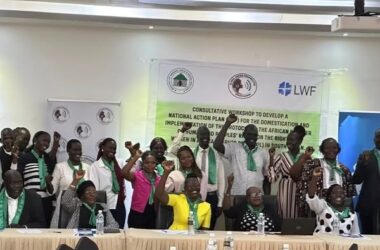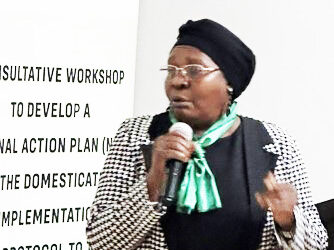By Alan Clement
An economic analyst has proposed that higher-denomination banknotes be introduced to the market to avert liquidity crises in the country.
In an interview with this outlet, Dr. Abraham Maliet believes that the introduction of South Sudanese Pounds (SSP) 10,000 and 50,000 would improve cash flow.
“Introducing higher denomination banknotes such as SSP 10,000 and SSP 50,000, like those circulating in neighboring Uganda, would help alleviate the pressure on cash flow and strengthen financial accessibility.” Dr. Maliet proposed.
Dr. Maliet said that, this initiative would rescue the market and save the country.
“Introducing high-denomination notes would encourage those keeping small bills at home to deposit them in banks in exchange for the new notes,” he said.
He stressed that it would help return money into the system and improve liquidity.
The economist acknowledged the ongoing digitalization and modernization of the financial system and urged the central bank to also prioritize boosting domestic production to expand the economy and ease liquidity challenges.
South Sudan’s liquidity crisis continues to ignite a debate among experts regarding possible solutions.
Despite government efforts to handle the liquidity crisis, some members of the public continue to face difficulty in accessing bulk cash in the commercial banks.
The Minister of Finance recently revealed a liquidity crisis in the country; however, he reaffirmed the government’s commitment to solve such a situation.
This is followed by a delay of salary payment for civil servants and organized forces.
According to Dr. Maliet, the liquidity crisis is created by an inconsistent cycle of cash flow in the economy.
“Money is sent from Juba to the states, but it does not come back,” Maliet said.
“There is little or no economic activity in the states to cycle that money back into the system. People just keep it in their houses,” he added.
The economic analyst expressed that storing cash in houses has created small, isolated economic circles and drains cash from the broader economy.
To address the liquidity problem, he reiterated the need to introduce higher-denomination notes.
Dr. Maliet proposed levying fines by the central bank on individuals holding large sums of money in their house in order to recover the cost of printing more money as well as paying domestic debts.
He reiterated the need to reintroduce the Letter of Credit system to reduce the need for physical U.S. dollars when importing goods.
In a separate interview, Dr. Ruben Moyi, Director of Marketing at Ivory Bank, disagreed with the approach of introducing big banknotes.
He recommended the central bank recalls certain currency notes printed within a given period of time by giving people a fixed deadline to return them to the banks and make money not deposited in time null and void.
“Printing higher denomination notes is risky and inflationary,” he cautioned. “It increases the chance of forgery and theft. Large sums of money can be moved around undetected, which fuels corruption and illegal activity,” he added.
“The better option will be recalling certain currency notes. This will encourage people keeping it in their house to deposit the money back into the system in a safer and more transparent way,” he further said.
The Bank of South Sudan has not responded to these proposals, but the debate is gaining traction as the country’s liquidity crisis persists. For now, all eyes are on policymakers as they weigh competing solutions, each with far-reaching implications for the fragile economy.




